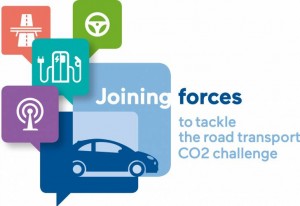 I was in Brussels yesterday, on behalf of the European Driving Schools Association (EFA) attending a very interesting Eco-driving Workshop. The event was part of an initiative titled “Joining forces to tackle the road transport CO2 challenge” organised by the European Automobile Manufacturers’ Association (ACEA) represents the 15 Europe-based car, van, truck and bus makers.
I was in Brussels yesterday, on behalf of the European Driving Schools Association (EFA) attending a very interesting Eco-driving Workshop. The event was part of an initiative titled “Joining forces to tackle the road transport CO2 challenge” organised by the European Automobile Manufacturers’ Association (ACEA) represents the 15 Europe-based car, van, truck and bus makers.
ACEA states that “there has been significant progress made in bringing down CO2 emissions from cars, vans, trucks and buses thanks to ongoing innovation efforts by the automotive industry. However, given the challenge of further reducing greenhouse gas emissions by 40% by 2030, more will have to be done than just focusing on new vehicle technology. If we want to drive CO2 emissions down further and faster, we need to adopt a more comprehensive approach.”
This workshop was designed to consider some of the ideas and challenges surrounding further CO2 reductions. There was a lot of very interesting discussion covering the many different types of research that has been carried out into eco-driving. There were a lot of excellent contributions but one of the most memorable for me was from Alexander Kroeller, Research Manager at TomTom he explained that Tom Tom have done a lot of research into which route people pick when using their sat-nav system. When faced with the choices of
Quickest Route – Shortest Route – Most Economical Route
drivers, almost without exception, pick the quickest route.
Hosting the event was Erik Jonnaert, Secretary General, European Automobile Manufacturers’ Association (ACEA); the moderator was Fabio Genoese, Research Fellow, Energy and Climate Change, Centre for European Policy Studies (CEPS).
Participants included Hélène Barkovic, Project Manager, IRU Projects, International Road Transport Union (IRU) Permanent Delegation to the EU; Christian Ernst, Senior Engineer, Strategy and Consulting, Institute for Automotive Engineering, RWTH Aachen University; Nathalie Ganzel, Vice Chair, Corporate Social Responsibility Circle, PostEurop; Zeljko Jeftic, Head of IRU Projects, International Road Transport Union (IRU) Permanent Delegation to the EU; Alexander Kroeller, Research Manager, TomTom; Olivier Orfila, Researcher, French Institute of Science and Technology for Transport, Development and Networks (IFSTTAR); Jean-Charles Pandazis, Head of Department, Eco and Energy Efficient Mobility, ERTICO – ITS – representing the ecoDriver project; Zissis Samaras, Director, Lab of Applied Thermodynamics, Department of Mechanical Engineering, Aristotle University; Vice Chair, European Road Transport Research Advisory Council (ERTRAC) Technology Platform; Zsolt Szalay, Head of Department of Automobiles and Vehicle Manufacturing & Associate Professor, Budapest University of Technology and Economics (BME) – on behalf of the European Conference of Transport Research Institutes (ECTRI); Ellen Townsend, Policy Director, European Transport Safety Council (ETSC); Chris Vanhoegaerden, Chair, Transport & Environment Committee, European Express Association (EEA); Public Affairs Manager, UPS

Be First to Comment